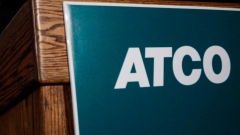Nov 30, 2023
Business confidence dips further on recession fears: CFIB survey
, BNN Bloomberg
What the fall fiscal update means for business leaders
A new survey suggests the confidence among Canadian small businesses has dipped to levels not seen since the early pandemic and the 2008 recession.
The Canadian Federation of Independent Business' November business barometer found confidence levels reached 45.6 points, considered “very low.” This marks the third consecutive month of sub-50 index readings, a mark not reached since the pandemic and 2008 financial crisis, the CFIB said on Thursday.
"Small businesses are facing stronger and stronger headwinds as they head into the last stretch of 2023, with real interest rates choking demand more firmly and continuing to severely restrict credit conditions, while governments at all levels keep adding more fiscal and regulatory pressure on entrepreneurs and employers,” Simon Gaudreault, chief economist and vice-president of research at the CFIB, wrote in a news release.
“Overall, business conditions have seldom been more challenging for so many businesses.”
TOP CONCERNS
Businesses were most concerned about taxes, insurance and borrowing rates for the month.
Quebec and Ontario remained the least confident provinces.
One of the few bright spots in the survey came from easing labour shortages, which appear to be returning to historical norms, the CFIB said.
"2023 has not been the year of the great recovery on Main Street, and hopes will now turn to 2024 to finally provide long-awaited normal business conditions,” Gaudreault said.
CALL FOR GOVERNMENT HELP
CFIB president Dan Kelly said the poor confidence levels signal to the government that small businesses need help, particularly when it comes to impending tax hikes and Canada Emergency Business Account loans.
"With four planned tax hikes over the next five months, and no relief for the looming Jan. 18 Canada Emergency Business Account repayment deadline, small business owners are increasingly worried about their futures," he said.
"Small firms need help, like pausing on tax hikes and more time to repay CEBA loans."
The federal government has extended to forgivable repayment deadline twice, but has remained firm in its Jan. 18 deadline.
METHODOLOGY
November findings are based on 588 responses from a stratified random sample of CFIB members, to a controlled-access web survey. Data reflect responses received from November 2 to 14. Findings are statistically accurate to +/- 4.0 per cent, 19 times in 20. Every new month, the entire series of indicators is recalculated for the previous month to include all survey responses received in that previous month. Measured on a scale between 0 and 100, an index above 50 means owners expecting their business's performance to be stronger over the next three or 12 months outnumber those expecting weaker performance. An index level near 65 normally indicates that the economy is growing at its potential.







